Ever observed why cats clean themselves after they eat? If you've spent time with a feline companion, you'll notice grooming is a significant part of their daily routine.
Cats groom after various activities—playing, sleeping, and notably, eating. This behavior isn't just a random habit; it's an instinct deeply ingrained from their earliest kittenhood, learned from their mothers.
But why do they specifically groom after meals? To quench your curiosity, we've researched this and other intriguing food-related behaviors of cats.
Cats ritually clean themselves after they eat because it is their natural instinct. Wild cats need to get rid of the food scent after eating to avoid attracting larger predators.
While it's a survival habit, grooming after eating is also your cat's way of maintaining general hygiene.
Do you find it intriguing that your domesticated cat still has close ties with their wild, natural instincts? We do too.
Continue reading as we break down grooming behavior and answer your questions on your cat's relationship with their food bowl.
A Look Into Grooming Behavior
Cats have all the necessary tools to groom and clean themselves. Their tongues have small barbs that allow them to easily remove materials or dirt and excess fur from their body.
Feline paws act as washcloths or combs. You will often see your cat lick their paws and use them to scrub their face and ears.
You should encourage grooming as it is an expected behavior. Your cat's ability to clean themselves is linked to benefiting other aspects of their life, including:
- Maintaining healthy skin
- Indicating health
- Social purposes
- Ability to soothe
Did you know that grooming also helps cats get rid of parasites?
This study from the University of California on the organization and control of grooming in cats states that one important grooming function is the removal of ectoparasites, like fleas.
The feline tongue is rough and covered with tiny structures called papillae. When self-grooming after a meal, most cats typically use their paw to remove tiny food debris and residue off their faces, occasionally stopping to lick the paw itself and clean it too.
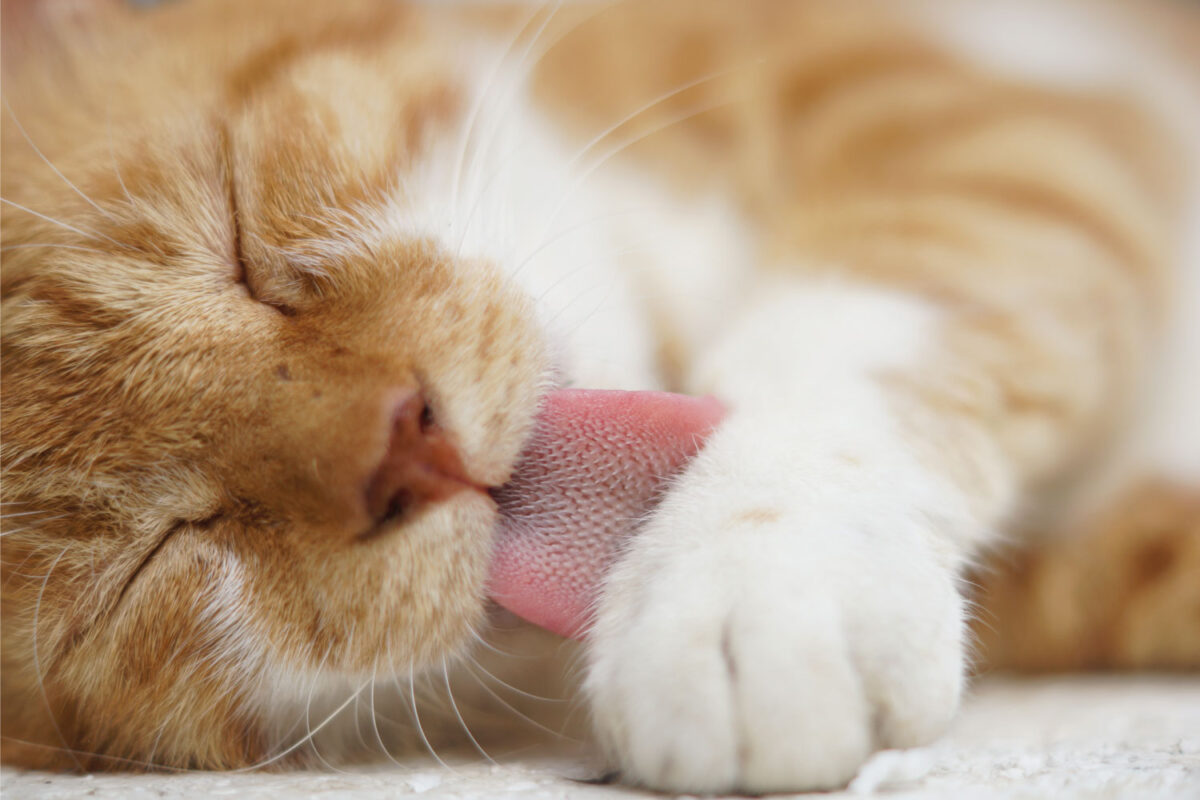
Why do cats lick their mouth after eating
Have you ever noticed your cat quickly lick their lips right after eating? In fact, anticipating the serving of their food, some cats even start licking their mouths before they begin eating.
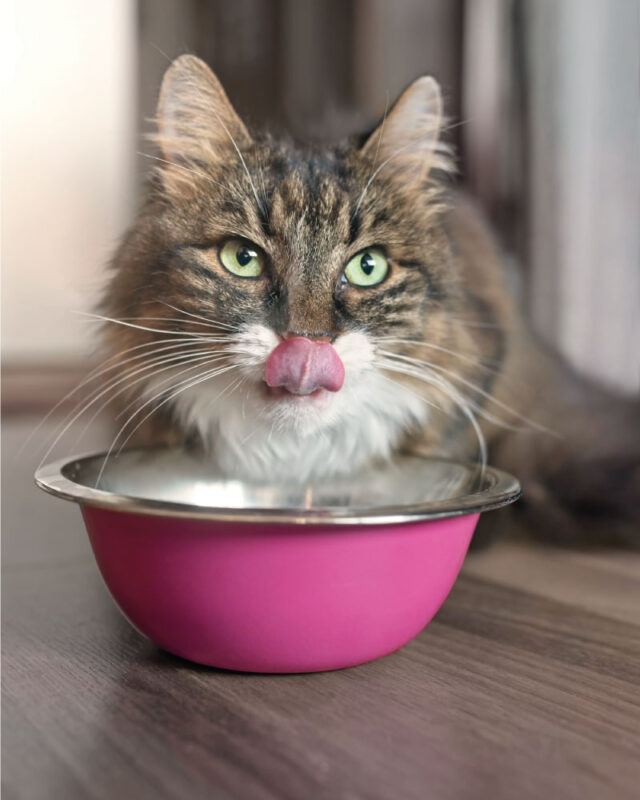
This is part of the feline self-grooming routine associated with eating. Your cat's tongue begins the cleaning right away, even before the cat sits down for the proper post-dinner grooming ritual.
After all, the mouth is the area that requires the most cleaning and is the easiest to clean up too - without the need to involve the paws.
Why do cats lick their paws after eating
Cats usually lick their paws several times during the post-meal cleanup, in between using the paws for reaching those hard-to-get spots behind their ears and across their cheeks.
Once the head area has been thoroughly cleaned, many cats take the time to thoroughly clean their paws, often chewing on them a little, to get to those hard-to-reach areas between their fingers.
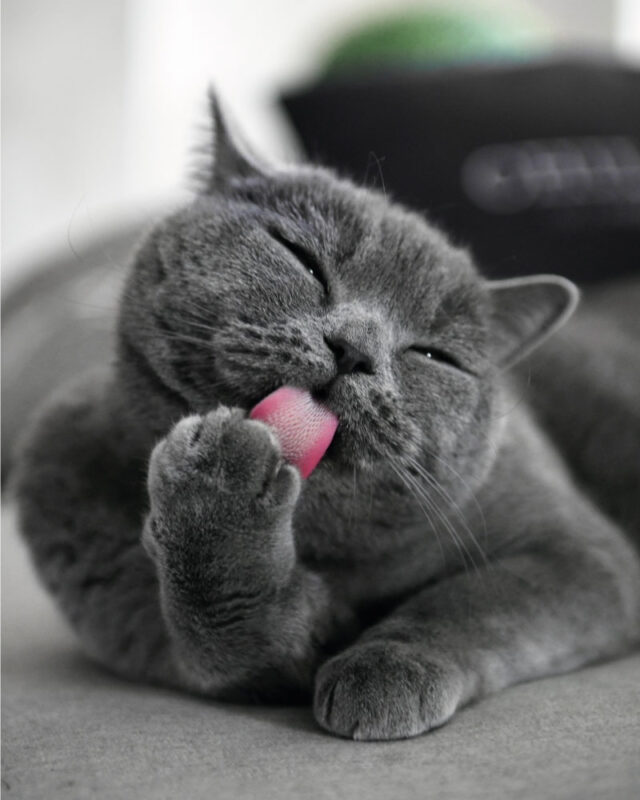
Cleaning the paws like that helps your cat make sure that all food scents are removed from their body. Since the paws are involved in cleaning up the face and head, it makes sense to finish the session by cleaning the paws themselves.
SIGN UP FOR THECATSITE'S EMAIL UPDATES >
What Does Normal Grooming Look Like?
You will want to be familiar with what normal and abnormal grooming looks like for your cat. Knowing the difference can help you detect early signs of illness or other issues your cat may be experiencing.
Your cat will have their own methods and style when it comes to their grooming habits. Learn what your cat's "normal" looks like by observing them in their daily routine.
Watch this compilation of cats grooming themselves below. All of these cats are showcasing normal grooming behavior.
You may find your cat spending 5-25% of their day grooming themselves; this is normal. Cats who live together can often be found grooming each other as well as themselves. You may even find your cat trying to groom you at times.
Your cat will groom their whole body, typically starting with the face and front paws, moving down the body, and then on to the hind limbs.
The video below shows what grooming after a meal normally looks like for a cat:
Read more on our blog post, Why Do Cats Groom Each Other? (The Answer Will Surprise You!).
What Is Considered Too Much Grooming?
Excessive grooming or psychogenic alopecia is a compulsive behavior that some domestic cats will experience. This is when grooming takes over other activities and is no longer functional.
If you notice bald patches or areas where the fur is broken, your cat may be over-grooming. This habit can cause trauma to the paws, tail, and skin anywhere on the body. The increased risk of skin infections and rashes makes excessive grooming dangerous for your cat's health.
Too much grooming can be attributed to stress or other environmental factors. You should seek advice from a veterinarian if you notice excessive grooming with your cat.
Read more about psychogenic alopecia here.
More interesting feline behaviors around the food dish
Now that you know everything there is to know about why cats groom themselves after eating, let's take a look at a few other interesting behaviors that are related to feeding. While not displayed by all cats, these behaviors can sometimes happen and leave owners baffled.
Why Does My Cat Scratch The Floor Around Its Food Dish?
Like grooming after eating, scratching the floor around food or water bowls comes from your cat's natural instincts. Cats are considered predators and in the wild, they must protect themselves from other bigger predators.
To help keep themselves safe, cats will bury or cover any leftover food to hide any trace or scent it may have.
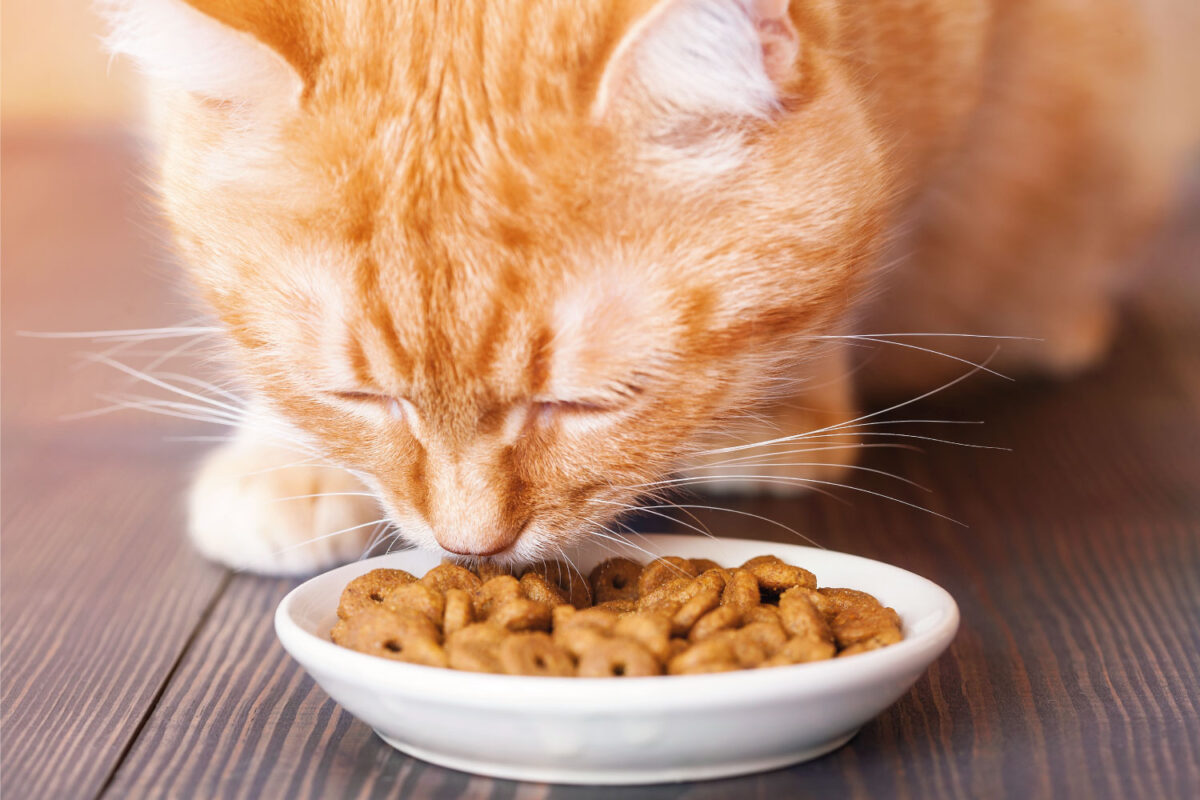
This behavior is completely normal for your domestic cat. If you notice them scratching around food or water bowls, there is no need for concern.
Why Does My Cat Keep Flipping Its Food Bowl?
You may find it frustrating if your cat is flipping over their food bowl all the time. This may seem like just bad manners, but this habit can be the effect of a direct cause.
Cats' whiskers are sensitive sensors. If their food bowl is not deep or wide enough, their whiskers brush against the sides of the bowl. This friction can cause discomfort for your cat.
By flipping the bowl, your cat understands that this stops the discomfort. You can try changing the size and even the material of your food bowls to try to correct this behavior.
If you've gone through bowl changes and have seen no improvement, try looking at the food. Our companions can be picky at times. The freshness of the food, or lack of it, can motivate this flipping action. You may want to try feeding different brands of cat food or fresher foods.
Your cat could be flipping their food bowl because they are attention-seeking. They may have realized flipping the bowl gets your immediate and undivided attention. Try reacting differently or feeding your cat out of sight. This may be a good time to invest in a no-flip bowl for your furry friend.

Amazon offers a no-slip, no-tip food and water bowl here
Food bowl flipping can be annoying and inconvenient behavior, but it is not impossible to correct. Swapping bowls, changing the food, or experimenting with different feeding locations takes only a little effort. Be patient and you will find what is best for you and your companion.
Have more questions about changing your cat's behavior? Read our blog post, Cat Behavior Problems [What To Do And What Not To Do].
Why Does My Cat Never Finish Her Food?
You may find yourself filling your cat's food bowl and returning to a hefty amount of leftovers. Initially, you might be concerned that your cat has lost its appetite. Don't worry quite yet.
Cats are known to eat multiple times throughout the day versus eating everything in one sitting. Their stomachs are small and fill quickly.
Often, pet owners leave food out, allowing their cats to return to the food bowl whenever hunger strikes.
The habit of eating small amounts, several times a day, is a habit that goes back to your cat's wild instincts. Wild cats obtain their nutrition and energy from eating small rodents throughout the day. You can provide toys filled with kibble or treats to simulate these nutritious snacks and engage your cat's predatory instincts.

You can view a kibble dispensing toy for your cat here on Amazon.
Make Sure To Clean Your Paws!
Cats form the majority of their habits from their natural instincts. Many of these behaviors start as a kitten and are learned from their mom. Our cats are unique, beautiful creatures that we are constantly learning about. We hope you found this article insightful when it comes to your cat's wild instincts revolving around grooming and food.
SIGN UP FOR THECATSITE'S EMAIL UPDATES >
Do you have more questions as a new cat owner? Check out our blog post, First-Time Cat Owner's Guide.
Need to pin this article? Here's a pin for you -
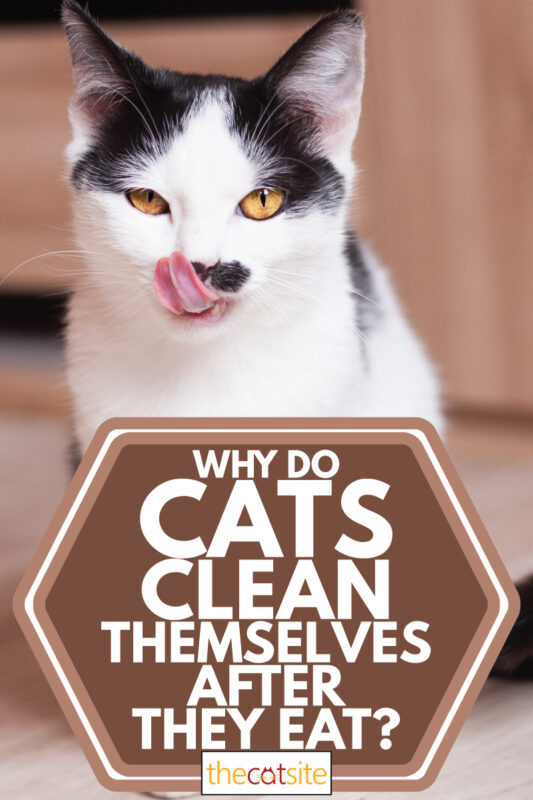
Note: We may get commissions for purchases made through links on this page.

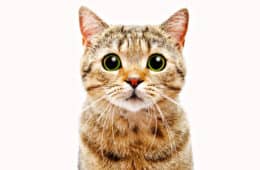
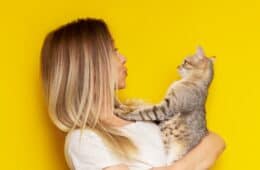
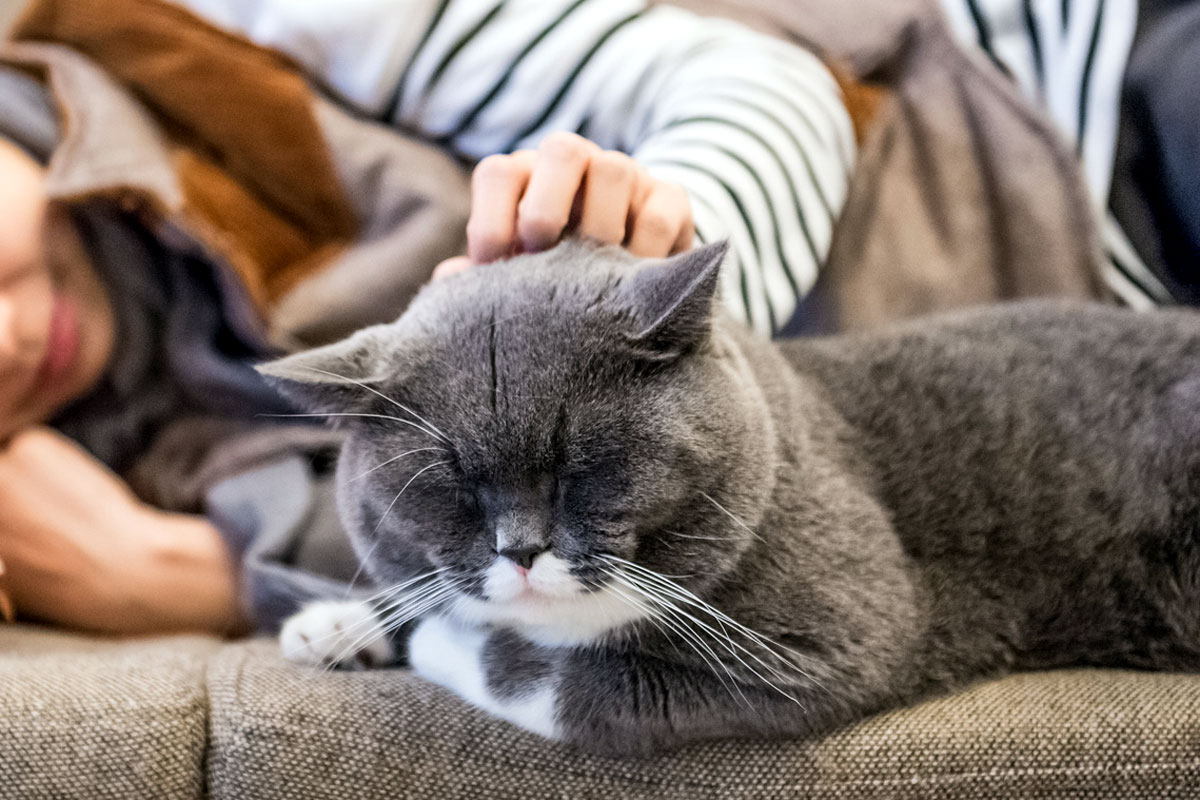
3 comments on “Why Do Cats Clean Themselves After They Eat? [Answered]”